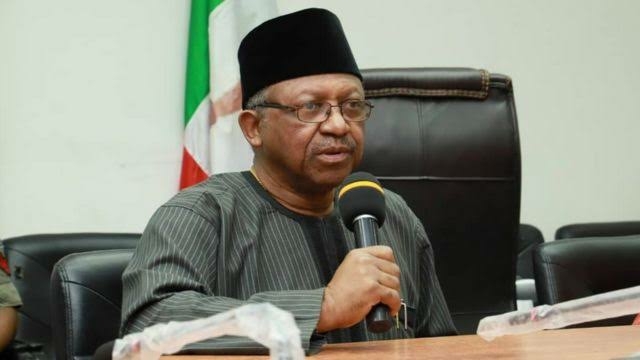Minister of Health, Dr. Osagie Ehanire
The Presidential Task Force (PTF) on COVID-19 says available records show that there is a global decline in cases of COVID-19 and deaths.
The Minister of Health, Dr Osagie Ehanire, who stated this at the PTF national briefing on Monday in Abuja, said: “This trend in reduction compares with global observations of seeming decline in COVID-19 cases, signifying that the second wave may be receding.
“We are, however, not drawing conclusions yet and certainly not declaring victory but rather watching developments as they unfold nationally and internationally, ready to make use of comparative advantages that may emerge.
“We are intensifying the monitoring of COVID-19 positive cases, especially those that can self-isolate, by strengthening and improving the capacity of personnel, to manage home-based care.”
He, however, emphasised that those on home-based care should report to their hospital or case manager, immediately they experienced symptoms or felt their symptoms were getting worse.
“Experience has shown that COVID-19 disease can deteriorate suddenly and rapidly, resulting in life threatening severity that can be managed if presented early enough. Late presentation is a leading cause of increase in mortality.
“Findings from supportive supervision of treatment centres also indicate that vulnerable and ‘at risk’ persons are among those reluctant to accept hospital admission, especially if they have no severe symptoms. It is important to follow medical advice and comply with directives.
“The bed occupancy at our isolation and treatment centres is about 36 per cent, so there is sufficient bed space to comfortably accommodate patients and we stand ready to redistribute from heavy burden to lower burden hospitals, if the need arises,” Ehanire said.
He said there were reports of an offer of 300 million doses of Sputnik V vaccines to the AVATT portfolio, which would boost availability to 557 million, adding that it would be a great relief to the African region and also increased the variety of vaccines to four.
“The vaccine coordination committee will advise on the best options for Nigeria, bearing salient factors in mind. Nigeria is aware of official reports of large scale fraud and counterfeit vaccines that are already in circulation,” the minister said.
He explained that the country’s vaccine needs for this year were virtually fully satisfied by multilateral and bilateral original manufacturer sources, hence the ministry did not need to procure vaccines from private importers.
He added that no vaccine would be allowed into the country unless it was certified by NAFDAC.
“The need to involve the private sector in dispensing vaccines will be studied by the vaccine coordinating committee and NPHCDA, who have the mandate to administer vaccines in Nigeria.
“We must, however, remember that the COVID-19 vaccine is not an ordinary routine vaccine but an unfamiliar, novel vaccine with properties that are still being studied.
“There may be effects during their administration, for which government must issue indemnification and take responsibility, which will not cover vaccines imported or administered privately, outside of legal framework.
“We applaud moves to support COVID-19 vaccine financing by the Nigerian private sector, which will be exclusively channelled through the account Nigeria has opened with the Afrexim Bank in Addis Ababa,” he said.
Speaking on Ebola and Nigeria’s preparation to forestall any outbreak, the minister said Nigeria was closely observing developments on its outbreak in Guinea and working with the West African Health Organisation (WAHO) to contain it and prevent the spread to other countries in the region.
“We are pleased to note that ECOWAS countries adjacent to the epicenter are taking strict measures with regard to checking movement of persons.
“Our Port Health Service Officers are on high alert to step up border surveillance of travellers arriving by air or overland from destinations around the outbreak country to avert disease importation,” Ehanire said.
According to him, although Nigeria is classified as a moderate Ebola risk country because of its distance from Guinea, health workers in hospitals have also been put on alert to have a high index of suspicion.
“The population is hereby requested to report suspicious symptoms, including fever and bleeding in the community among recent arrivals from the West African subregion.
“I also use this opportunity to advise Nigerians intending to visit countries in the general area, to delay the visit, while WHO carries out support activities, including ring vaccinations.
“No increase in cases or fatality has been reported so far from Guinea,” he added.








Discussion about this post